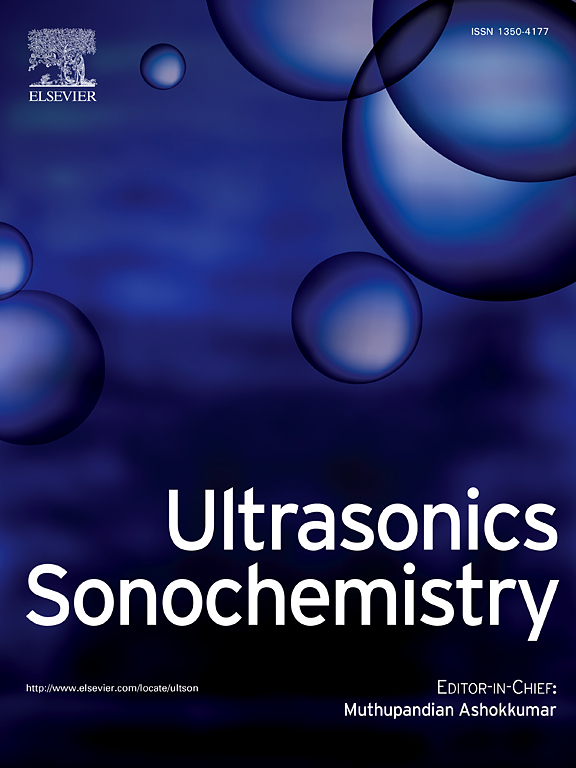利用酸水解和超声波制造负载有 beta 胡萝卜素的小米淀粉纳米胶囊:特性、释放行为和生物活性保持。
IF 9.7
1区 化学
Q1 ACOUSTICS
引用次数: 0
摘要
利用酸水解工艺从高粱、狐尾粟和珍珠粟这三种不同来源中提取出新型小米淀粉基纳米粒子。采用一种环保、无风险的超声波技术将β-胡萝卜素封装在淀粉纳米颗粒中,制成纳米胶囊,以保护β-胡萝卜素在胃肠道条件下的生物活性,并增加其食用后的可及性。对配制的纳米胶囊进行了 zeta 电位、粒度和封装效率检测。载β-胡萝卜素的高粱(SSB)、狐尾粟(FSB)和珍珠粟(PSB)淀粉纳米颗粒的粒径分别为416、399和587 nm,zeta电位分别为-17.98、-19.03和-22.31 mV。发现 SSB、FSB 和 PSB 纳米胶囊的封装效率分别为 85.83%、89.65% 和 78.32%。扫描电子显微镜(SEM)也被用来确认纳米胶囊中是否含有胡萝卜素。使用 ATR-FTIR 也证明了β胡萝卜素在淀粉纳米颗粒中的封装,该方法显示了在 3000、1086 和 885 cm-1 处出现的宽特征峰,这些峰之间没有任何明显的相互作用。β-胡萝卜素含量较高的肠液确保了β-胡萝卜素在肠道中的可控释放。就抗氧化活性而言,封装的胡萝卜素比游离的胡萝卜素更具生物活性。本文章由计算机程序翻译,如有差异,请以英文原文为准。
Fabrication of millet starch nanocapsules loaded with beta carotene using acid hydrolysis and ultrasonication: Characterisation, release behaviour and bioactivity retention
The acid hydrolysis process was used to create novel millet starch-based nanoparticles from three different sources: sorghum, foxtail millet and pearl millet. An environment-friendly, risk-free ultrasonication technique was used for encapsulating beta carotene in starch nanoparticles to create nanocapsules that will shield the bioactivity of beta carotene in gastrointestinal conditions and increase its accessibility after consumption. Formulated nanocapsules were examined for zeta potential, particle size and encapsulation efficiency. The particle dimensions of beta carotene-loaded sorghum (SSB), foxtail millet (FSB), and pearl millet (PSB) starch nanoparticles were 416, 399 and 587 nm with zeta potential of −17.98, −19.03 and –22.31 mV respectively. Encapsulation efficiencies of nanocapsules were found to be 85.83, 89.65 and 78.32 % for SSB, FSB and PSB respectively. Scanning electron microscopy (SEM) was also harnessed as a confirmatory tests towards the presence of beta carotene in nanocapsules. Beta carotene encapsulation in starch nanoparticles was also demonstrated using ATR-FTIR which revealed broad characteristic peaks at 3000, 1086 and 885 cm−1 that occur without any discernible interaction. Intestinal juice with higher beta carotene content ensured controlled release in the intestine. Encapsulated beta carotene showed more bioactive properties in terms of antioxidant activity as compared to free beta carotene form.
求助全文
通过发布文献求助,成功后即可免费获取论文全文。
去求助
来源期刊

Ultrasonics Sonochemistry
化学-化学综合
CiteScore
15.80
自引率
11.90%
发文量
361
审稿时长
59 days
期刊介绍:
Ultrasonics Sonochemistry stands as a premier international journal dedicated to the publication of high-quality research articles primarily focusing on chemical reactions and reactors induced by ultrasonic waves, known as sonochemistry. Beyond chemical reactions, the journal also welcomes contributions related to cavitation-induced events and processing, including sonoluminescence, and the transformation of materials on chemical, physical, and biological levels.
Since its inception in 1994, Ultrasonics Sonochemistry has consistently maintained a top ranking in the "Acoustics" category, reflecting its esteemed reputation in the field. The journal publishes exceptional papers covering various areas of ultrasonics and sonochemistry. Its contributions are highly regarded by both academia and industry stakeholders, demonstrating its relevance and impact in advancing research and innovation.
 求助内容:
求助内容: 应助结果提醒方式:
应助结果提醒方式:


